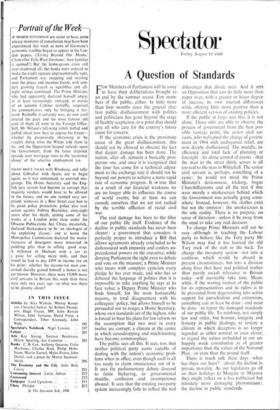A Question of Standards
EIEW Members of Parliament will be sorry to have their deliberations brought to an ,end by the summer recess. Few mem- bers of the public, either. In little more than four months since the general elec- tion public disillusionment with politics and politicians has gone beyond the stage of healthy scepticism, to a point that should give all who care for the country's future cause for concern.
If the economic crisis is the proximate cause of the great disillusionment, -this should not be allowed to obscure the fact that deeper damage has been done. The nation, after all, remains a basically pros- perous one, and once it is recognised that the time has come for a technical adjust- ment to the exchange rate it should not be beyond our powers to achieve a more rapid rate of economic progress. It is, true that as a result of our financial weakness we are no longer able to influence the course of world events; but at least we can console ourselves that we are not racked by the terrible affliction of racial civil• war.
The real damage has been to the fibre of our public life itself. Evidence of the • decline in public standards has never been clearer : a government that considers it perfectly proper to introduce a Bill that allows agreements already concluded to be dishonoured with impunity and confers un- precedented powers on the executive, while denying Parliament the right even to debate and vote on the measure; a Prime Minister who treats with complete cynicism every pledge he has ever made, and who has so debased the language of politics that it is impossible to take anything he says at its face value; a Deputy Prime Minister who finds himself, for the most honourable reasons, in total disagreement with his colleagues' policy, but allows himself to be persuaded not to resign; a Home Secretary, whose own standards are of the highest, who is forced to base his plans for law reform on the assumption that two men in every twelve are corrupt; a climate at the centre in which eavesdropping and witch-hunting have become commonplace.
The public sees all this. It sees, too, that neither political party seems capable of dealing with the nation's economic prob- lems when in office, even though each is all too ready to claim omniscience out of it. It sees the parliamentary debate descend to futile bickering, as governmental muddle, confusion . and incompetence abound. It sees that the existing two-party system increasingly fails to reflect the real differences that divide men. And it sees an Opposition that can do little more than paper over, with a greater or lesser degree of success, its own internal differences while offering little more positive than a more efficient version of existing policies.
If the public at large sees this, it is not alone. Those who are able to observe the process of government from the best pos- sible vantage point, the senior civil ser- vants, who welcomed the change of govern- ment in 1964 with undisguised relief, are now deeply disillusioned. The muddle, in- efficiency and total lack of planning or foresight—let alone control of events—that the man in the street dimly senses is all too real to the man in Whitehall. The senior civil servant is, perhaps, something of a cynic: he would not mind the Prime Minister's deviousness, trickery, bogus Churchillianisms and all the rest if this were merely a smokescreen behind which the Government was actually going some- where. Instead, however, the clothes exist but not the emperor : the smokescreen is the sole reality. There is no purpose, no sense of direction—unless it be away from the need to take any real decision.
To change Prime Ministers will not be easy—although in teaching the Labour party to behave like the Tory party Mr Wilson may find it has learned the old Tory trick of the stab in the back. To change the two-party system—not into a coalition, which would be absurd in present circumstances, but into a division along lines that have real political (rather than purely social) relevance in Britain today—will inevitably take time. Mean- while, if the waning respect of the public for its representatives and its rulers is to be prevented from degenerating into active support for parochialism and extremism, something can at least be done—and must be done—to repair the damaged standards of our public life. To reinforce, not simply law and order, but honour, integrity and honesty in public dealings; to restore a climate in which deception is no longer regarded as either normal or even clever; to regard the values embedded in our un- happily weak constitution as of greater importance than the values of the National Plan—or even than the pound itself.
There is much talk these days—when has there not been?—about the decline in private morality. As our legislators go off on their holidays to Margate or Majorca they might reflect on a less publicised but infinitely more damaging phenomenon:, the decline in public standards.






























 Previous page
Previous page